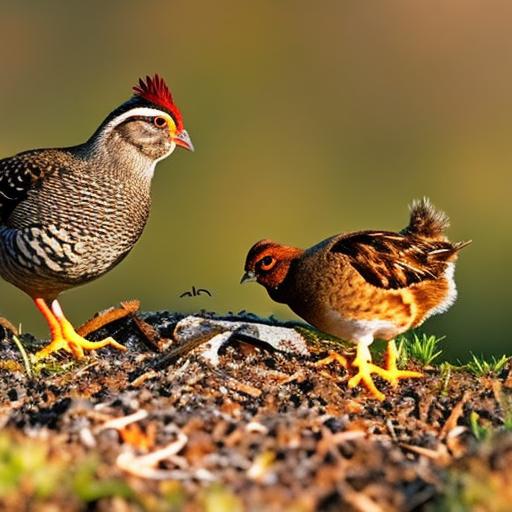When it comes to raising chickens, space is a crucial factor to consider. Chickens need enough space to move around, stretch their wings, and engage in natural behaviors like scratching and dust bathing. For a standard-sized chicken, it is recommended to provide at least 2-3 square feet of coop space per bird, and 8-10 square feet of outdoor space. This allows them to have enough room to roam and prevents overcrowding, which can lead to stress and aggressive behavior. Additionally, providing ample space helps to reduce the risk of disease transmission and allows for better ventilation within the coop.
In terms of coop design, it is important to include roosting bars for the chickens to perch on at night, nesting boxes for egg-laying, and easy access for cleaning. The outdoor space should be fenced in to protect the chickens from predators and provide a safe environment for them to forage and explore. Overall, providing adequate space for chickens is essential for their physical and psychological well-being.
Chickens need space to move around freely, stretch their wings, and engage in natural behaviors like scratching and dust bathing. It is recommended to provide at least 2-3 square feet of coop space per bird, and 8-10 square feet of outdoor space. This allows them to have enough room to roam and prevents overcrowding, which can lead to stress and aggressive behavior. Additionally, providing ample space helps to reduce the risk of disease transmission and allows for better ventilation within the coop. Coop design should include roosting bars, nesting boxes, and easy access for cleaning. The outdoor space should be fenced in to protect the chickens from predators and provide a safe environment for them to forage and explore.
Key Takeaways
- Space Requirements:
- Chickens need at least 2-3 square feet of space per bird in the coop and 8-10 square feet in the run.
- Adequate space is essential for their health and well-being.
- Egg Production:
- Most laying hens will produce an egg almost every day.
- Proper nutrition and a stress-free environment are key factors in maximizing egg production.
- Noise Level:
- Chickens are generally quiet animals, but they can be noisy when laying eggs or if they feel threatened.
- Roosters are much louder than hens and may not be suitable for urban settings.
- Feeding and Care:
- Chickens require a balanced diet of grains, protein, and calcium to lay healthy eggs.
- Regular cleaning of the coop and providing fresh water are essential for their care.
- Temperament and Behavior:
- Chickens are social animals and thrive in a flock environment.
- They can be friendly and enjoy human interaction if handled gently from a young age.
- Health and Disease:
- Common health issues in chickens include respiratory infections, parasites, and egg binding.
- Regular health checks and proper sanitation can help prevent diseases.
- Regulations and Legal Considerations:
- Check local zoning laws and homeowner association regulations before keeping chickens.
- Some areas have restrictions on the number of chickens allowed and may require permits.
Egg Production
One of the main reasons people raise chickens is for their eggs. The egg production of chickens can vary depending on the breed, age, and environmental factors. On average, a healthy hen can lay about 250-300 eggs per year. However, some high-producing breeds can lay up to 300-350 eggs per year. It is important to note that egg production tends to decline as the hen gets older, with peak production occurring in the first year.
To ensure optimal egg production, it is important to provide a balanced diet that includes a high-quality layer feed with essential nutrients like calcium and protein. Additionally, ensuring that the hens have access to clean water at all times is crucial for egg production. Creating a comfortable and stress-free environment for the hens can also contribute to higher egg production. Overall, understanding the factors that influence egg production and providing proper care can help maximize the number of eggs your chickens produce.
Egg production can vary depending on the breed, age, and environmental factors. On average, a healthy hen can lay about 250-300 eggs per year, with some high-producing breeds laying up to 300-350 eggs per year. It is important to provide a balanced diet with high-quality layer feed containing essential nutrients like calcium and protein to ensure optimal egg production. Additionally, access to clean water at all times and a comfortable, stress-free environment can contribute to higher egg production. Understanding the factors that influence egg production and providing proper care can help maximize the number of eggs your chickens produce.
Noise Level
Chickens are known for their vocalizations, which can range from clucking and crowing to squawking. While some people find the sounds of chickens to be charming and comforting, others may find them noisy and disruptive. Roosters are typically the loudest members of the flock, as they crow to establish their territory and communicate with the hens. If noise is a concern, it is important to check local regulations regarding keeping roosters in residential areas.
In general, hens are quieter than roosters, but they can still produce a fair amount of noise, especially when laying eggs or communicating with each other. To minimize noise levels, providing enough space for the chickens, keeping them well-fed and entertained, and ensuring that their coop is well-maintained can help reduce excessive vocalizations. Additionally, choosing quieter breeds or keeping only hens can also help mitigate noise concerns.
Chickens are known for their vocalizations, which can range from clucking and crowing to squawking. Roosters are typically the loudest members of the flock, as they crow to establish their territory and communicate with the hens. If noise is a concern, it is important to check local regulations regarding keeping roosters in residential areas. Hens are generally quieter than roosters but can still produce a fair amount of noise, especially when laying eggs or communicating with each other. To minimize noise levels, providing enough space for the chickens, keeping them well-fed and entertained, and ensuring that their coop is well-maintained can help reduce excessive vocalizations.
Feeding and Care
Proper feeding and care are essential for maintaining the health and well-being of chickens. A balanced diet is crucial for ensuring that chickens receive the necessary nutrients for growth, egg production, and overall health. A high-quality commercial layer feed is recommended for laying hens, as it contains essential nutrients like calcium and protein. Additionally, providing access to grit and oyster shells can help with digestion and eggshell formation.
In addition to a balanced diet, chickens require access to clean water at all times. Regularly cleaning and maintaining the coop is also important for preventing disease and maintaining a healthy environment for the chickens. Providing enrichment activities like perches, dust bathing areas, and toys can help keep the chickens mentally stimulated and reduce stress.
Proper feeding and care are essential for maintaining the health and well-being of chickens. A balanced diet is crucial for ensuring that chickens receive the necessary nutrients for growth, egg production, and overall health. A high-quality commercial layer feed containing essential nutrients like calcium and protein is recommended for laying hens. Additionally, providing access to grit and oyster shells can help with digestion and eggshell formation. Access to clean water at all times and regular cleaning and maintenance of the coop are also important for preventing disease and maintaining a healthy environment for the chickens.
Temperament and Behavior
Chickens are social animals that thrive in a flock environment. They have complex social structures and hierarchies within their groups. Understanding chicken behavior can help in managing their interactions and ensuring their well-being. Chickens have individual personalities and can display a range of behaviors such as scratching, pecking, dust bathing, and roosting.
It is important to handle chickens gently and regularly to help them become more comfortable with human interaction. This can make it easier to perform health checks and administer any necessary treatments. Additionally, providing enrichment activities like perches, dust bathing areas, and toys can help keep the chickens mentally stimulated and reduce stress.
Chickens are social animals that thrive in a flock environment with complex social structures and hierarchies within their groups. Understanding chicken behavior can help in managing their interactions and ensuring their well-being. Chickens have individual personalities and can display a range of behaviors such as scratching, pecking, dust bathing, and roosting. Handling chickens gently and regularly can help them become more comfortable with human interaction, making it easier to perform health checks and administer any necessary treatments.
Health and Disease

Maintaining the health of your chickens is crucial for their overall well-being and productivity. Common health issues in chickens include respiratory infections, parasites, nutritional deficiencies, and injuries. Regular health checks are important for monitoring the condition of your flock and identifying any potential issues early on.
Preventative measures such as vaccination programs, parasite control, biosecurity practices, and providing a clean living environment can help reduce the risk of disease outbreaks. It is important to quarantine new birds before introducing them to an existing flock to prevent the spread of diseases. Additionally, seeking veterinary care when necessary is crucial for addressing any health concerns that may arise.
Maintaining the health of your chickens is crucial for their overall well-being and productivity. Common health issues in chickens include respiratory infections, parasites, nutritional deficiencies, and injuries. Regular health checks are important for monitoring the condition of your flock and identifying any potential issues early on. Preventative measures such as vaccination programs, parasite control, biosecurity practices, and providing a clean living environment can help reduce the risk of disease outbreaks.
Regulations and Legal Considerations
Before starting a chicken-raising venture, it is important to be aware of local regulations and legal considerations regarding keeping poultry. Zoning laws may dictate whether or not you are allowed to keep chickens on your property or restrict the number of birds you can have. Some areas may also have specific regulations regarding coop design, noise levels, waste management, and biosecurity measures.
It is important to research local regulations before getting chickens to ensure that you are in compliance with any legal requirements. Additionally, being a responsible chicken owner means being considerate of your neighbors by minimizing noise levels, properly managing waste, and maintaining a clean living environment for your flock.
Before starting a chicken-raising venture, it is important to be aware of local regulations regarding keeping poultry. Zoning laws may dictate whether or not you are allowed to keep chickens on your property or restrict the number of birds you can have. Some areas may also have specific regulations regarding coop design, noise levels, waste management, and biosecurity measures. Researching local regulations before getting chickens ensures compliance with legal requirements while being considerate of neighbors by minimizing noise levels, properly managing waste, and maintaining a clean living environment for your flock.
If you’re considering keeping quail versus chickens, you may also be interested in learning about innovative chicken coop designs. Poultry Wizard offers a fascinating article on creating a chicken coop trampoline, which provides an engaging and dynamic environment for your chickens. Check it out here to discover how this unique setup can benefit your flock’s well-being and happiness.
FAQs
What are the main differences between keeping quail and chickens?
Quail are smaller in size compared to chickens and require less space. They also lay smaller eggs and are generally quieter than chickens. Quail are also more prone to stress and require a more controlled environment.
What are the advantages of keeping quail over chickens?
Quail require less space, making them suitable for urban or small backyard settings. They also reach maturity and start laying eggs at a younger age compared to chickens. Quail eggs are also considered a delicacy and have a higher nutritional value than chicken eggs.
What are the advantages of keeping chickens over quail?
Chickens are more readily available and have a longer lifespan compared to quail. They also produce larger eggs and are more commonly used for meat production. Chickens are also more adaptable to different climates and environments.
What are the main considerations when deciding between keeping quail or chickens?
Consider the amount of space available, local regulations, and the purpose of keeping the birds (eggs, meat, or both). Also, consider the level of care and attention required for each species, as well as the noise and behavior characteristics.
Can quail and chickens be kept together?
It is not recommended to keep quail and chickens together, as they have different space and environmental requirements. Additionally, there is a risk of disease transmission between the two species. It is best to keep them separate to ensure their health and well-being.
Meet Walter, the feathered-friend fanatic of Florida! Nestled in the sunshine state, Walter struts through life with his feathered companions, clucking his way to happiness. With a coop that’s fancier than a five-star hotel, he’s the Don Juan of the chicken world. When he’s not teaching his hens to do the cha-cha, you’ll find him in a heated debate with his prized rooster, Sir Clucks-a-Lot. Walter’s poultry passion is no yolk; he’s the sunny-side-up guy you never knew you needed in your flock of friends!







